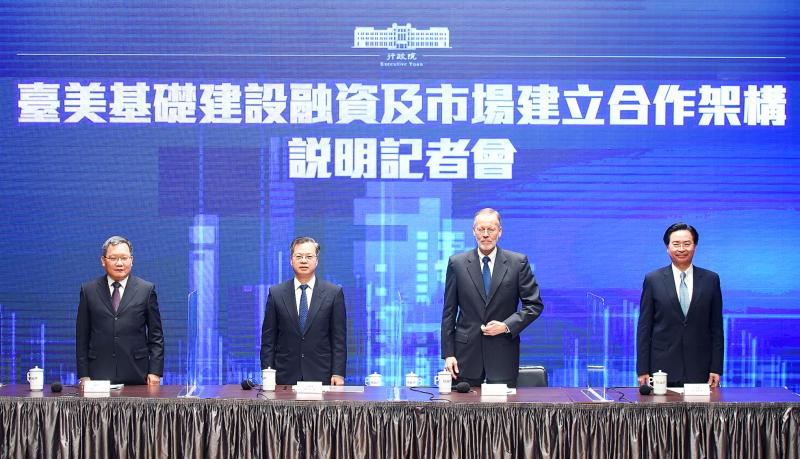Taiwan and the US are to collaborate on infrastructure funding in Asia and Latin America, which would boost Taiwan’s clout in the international community, Minister of Finance Su Jain-rong (蘇建榮) said yesterday.
The Framework to Strengthen Infrastructure, Finance and Market Cooperation, alongside the New Southbound Policy and the US’ Indo-Pacific strategy, would allow Taiwan to initiate dialogue with more friendly countries in the region, while allowing Taiwanese firms to branch out into regional debt markets, Su said.
The Ministry of Economic Affairs, the Ministry of Finance, the Ministry of Transportation and Communications, and the Financial Supervisory Commission would be in charge of four task forces with direct access to the US, he said.

Photo: Liao Chen-huei, Taipei Times
Taiwan has extensive business interactions with Southeast Asian countries such as Vietnam and Thailand, and nine of the remaining 15 countries that officially recognize its government are in Latin America or the Caribbean.
Su said that a memorandum of understanding — signed on Sept. 17 — for the framework was a “new model to deepen ties.”
As stipulated by the framework, the Ministry of Finance and the US Department of the Treasury are to establish the task forces to facilitate collaborative projects for infrastructure — government and private — via investment.
American Institute in Taiwan Director Brent Christensen said that experts would meet this fall to discuss how to promote the restructuring of regional supply chains.
US clients have been a driving force in the relocation of supply chains composed of Taiwanese-owned technology and household appliance businesses back to Taiwan from China, Christensen said.
Minister of Foreign Affairs Joseph Wu (吳釗燮) said that the framework has symbolically taken Taiwan-US relations to another level.
Both sides would continue to explore possible avenues of collaboration, Wu said.
National Development Council (NDC) Minister Kung Ming-hsin (龔明鑫) said that the framework’s signing shows that Taiwan is more capable and confident of making contributions in the international community and that the nation would strive to make the most of its contributions in regional construction efforts.
Presidential Office spokesman Xavier Chang (張惇涵) said that the framework, on top of a delegation headed by US Undersecretary of State for Economic Growth, Energy and the Environment Keith Krach that visited Taiwan from Sept. 17 to 20, showed that the Taiwan-US relationship was advancing to another level.
Whether it is for national development or to fulfill Taiwan’s obligations as a member of the international community, the nation must have more significant participation in global affairs, Chang said, adding that this includes ongoing collaborations with the US in the Indo-Pacific region.
Chang attributed the framework and Krach’s visit to the government’s diplomacy strategy, adding that the government was moving forward one step at a time.
Taiwan would continue to deepen collaborations with the US on all fronts and industries, and attempt to create mutually beneficial scenarios, Chang said.

ACTION PLAN: Taiwan would expand procurement from the US and encourage more companies to invest in the US to deepen bilateral cooperation, Lai said The government would not impose reciprocal tariffs in retaliation against US levies, President William Lai (賴清德) said yesterday, as he announced five strategies to address the issue, including pledging to increase Taiwanese companies’ investments in the US. Lai has in the past few days met with administrative and national security officials, as well as representatives from various industries, to explore countermeasures after US President Donald Trump on Wednesday last week announced a 32 percent duty on Taiwanese imports. In a video released yesterday evening, Lai said that Taiwan would not retaliate against the US with higher tariffs and Taiwanese companies’ commitments to

Intelligence agents have recorded 510,000 instances of “controversial information” being spread online by the Chinese Communist Party (CCP) so far this year, the National Security Bureau (NSB) said in a report yesterday, as it warned of artificial intelligence (AI) being employed to generate destabilizing misinformation. The bureau submitted a written report to the Legislative Yuan in preparation for National Security Bureau Director-General Tsai Ming-yen’s (蔡明彥) appearance before the Foreign Affairs and National Defense Committee today. The CCP has been using cognitive warfare to divide Taiwanese society by commenting on controversial issues such as Taiwan Semiconductor Manufacturing Co’s (TSMC, 台積電) investments in the

‘SPECIAL CHANNEL’: Taipei’s most important tasks are to stabilize industries affected by Trump’s trade tariffs and keep negotiations with Washington open, a source said National Security Council Secretary-General Joseph Wu (吳釗燮) arrived in the US for talks with US President Donald Trump’s administration, a source familiar with the matter said on Friday. Wu was leading a delegation for a meeting known as the “special channel,” the Financial Times reported earlier. It marked Trump’s first use of the channel since returning to the White House on Jan. 20. Citing a source familiar with the matter, the Financial Times reported that Minister of Foreign Affairs Lin Chia-lung (林佳龍) was also a part of the delegation. The visit came days after China concluded war games around Taiwan and amid Trump’s

HELPING HAND: The steering committee of the National Stabilization Fund is expected to hold a meeting to discuss how and when to utilize the fund to help buffer the sell-off The TAIEX plunged 2,065.87 points, or 9.7 percent, to close at 19,232.35 yesterday, the highest single-day percentage loss on record, as investors braced for US President Donald Trump’s tariffs after an extended holiday weekend. Amid the pessimistic atmosphere, 945 listed companies led by large-cap stocks — including Taiwan Semiconductor Manufacturing Co (TSMC, 台積電), Hon Hai Precision Industry Co (鴻海精密) and Largan Precision Co (大立光) — fell by the daily maximum of 10 percent at the close, Taiwan Stock Exchange data showed. The number of listed companies ending limit-down set a new record, the exchange said. The TAIEX plunged by daily maxiumu in just